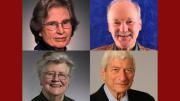The Graduate School of Arts and Sciences Centennial Medal, first awarded in 1989 on the occasion of the school’s hundredth anniversary, honors alumni who have made contributions to society that emerged from their graduate study at Harvard. It is the highest honor the Graduate School bestows, and awardees include some of Harvard’s most accomplished graduates. The 2021 recipients are:
Lotte Bailyn, A.M. ’53, Ph.D. ’56, Social Psychology
Lotte Bailyn is the T Wilson (1953) professor of management, emerita, at MIT’s Sloan School of Management, where she was the first woman faculty member. She studies the relationship between institutional and organizational processes and employee’s lives, emphasizing the importance of diversity in educational and business settings. From 1995 to 1997 she was the Horner Distinguished Visiting Professor at Radcliffe’s public policy institute. From 1997 to 1999, she was chair of the MIT faculty, succeeding Lawrence S. Bacow, then an MIT professor. An expert in work and family dynamics, she argued in her 1993 book, Breaking the Mold, that considering work and family life as separate spheres is no longer tenable in the current competitive business environment.
Former dean of Harvard Business School Nitin Nohria, who was once her doctoral student and is now a Harvard University Distinguished Service Professor, calls her “a remarkable scholar, one of a rare class of individuals who leaves a permanent imprint on the way you view and approach research and the processes that underlie it. She has fundamentally shaped generations of academics.”
John Hutchinson, S.M. ’61, Ph.D. ’63, Mechanical Engineering
John Hutchinson is Lawrence professor of engineering and Gordon McKay professor of applied mechanics, emeritus at the Harvard Paulson School of Engineering and Applied Sciences (SEAS). An expert in the way that materials behave and fracture under stress, he is the second most-cited researcher in the field of solid mechanics, with more than 95,000 citations on record. His research in the 1960s focused on quantifying how imperfections in shell-shaped structures, such as those used in aerospace applications, could help avoid the risk of catastrophic failure. Since then, he has made important contributions in myriad subfields of materials science, from thin film mechanics to the electrical and optical properties of multilayered materials.
SEAS dean Frank Doyle, Armstrong professor of engineering and applied sciences, said that Hutchinson is “recognized throughout the world for his scholarly contributions to the field of mechanics, as well as for his far-reaching impact as a generous and nurturing mentor. In so many spheres, including at SEAS, he has had a profound impact, and he continues to inspire all around him.”
Marvin Kalb, A.M. ’53, Regional Studies–USSR
Journalist Marvin Kalb is the founding director of the Shorenstein Center on Media, Politics and Public Policy at Harvard Kennedy School, where he is Murrow professor of press and public policy, emeritus. (He taught at the school from 1987 to 1999). Kalb’s career began at CBS News when he was hired by Edward R. Murrow; he later served as chief diplomatic correspondent for the CBS Evening News with Walter Cronkite, and then as moderator for NBC’s Meet the Press, where he was succeeded by Chris Wallace. He has hosted The Kalb Report, a public broadcasting series on media ethics and responsibility, for 26 years. He is also the author of several works of nonfiction, most recently, Enemy of the People: Trump’s War on the Press, the New McCarthyism, and the Threat to American Democracy (2018).
Nancy Gibbs, who currently directs the Shorenstein Center, says that it “could not have the influence and impact it now enjoys without the strong foundation Marvin built. Our mission during this very challenging period for democracy is to study, strengthen, and sustain the values that Marvin embodies.”
Margaret “Peggy” McIntosh ’56, A.M. ’61, Ph.D. ’67, English and American Literature and Language
Peggy McIntosh is the founder of the National Seeking Educational Equity and Diversity (SEED) Project, which aims to develop inclusive curricula for educators and other leaders. Since its founding, the organization has trained more than 2,200 teachers in the United States and abroad. In 1988, she published “White Privilege and Male Privilege: A Personal Account of Coming to See Correspondences Through Work in Women’s Studies,” an influential essay that explained how being white provided an unearned advantage in society, based solely on race. (A condensed version, “White Privilege, Unpacking the Invisible Knapsack,” appeared the following year.
Sherri Charleston, Harvard’s chief diversity and inclusion officer, said that McIntosh’s contributions to higher education “are estimable. She has shaped the way that we now think about questions of privilege” and “the language that we use to think about how we empower educational institutions, in particular, to create peer conversation groups that can drive interpersonal and institutional change.”
For more about the honorands, and to read the citations that accompanied the awarding of their Centennial Medals, see the Graduate School of Arts and Science webpage.
Read the full citations here:









